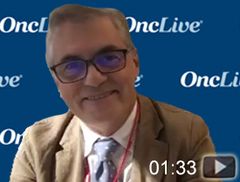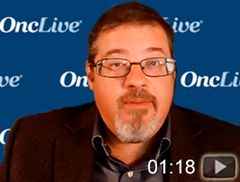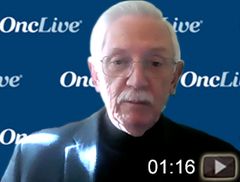
Scientific Interchange & Workshop
- The Evolving Role of Immunotherapy in Metastatic Non–Small Cell Lung Cancer
- Volume 1
- Issue 1
Dr. Raez on the Impact of PD-L1 Status on Immunotherapy Outcomes in NSCLC
Luis E. Raez, MD, discusses the impact of PD-L1 status on immunotherapy outcomes for patients with non–small cell lung cancer.
Episodes in this series

Luis E. Raez, MD, medical director of Memorial Cancer Institute, and chief of Hematology/Oncology at Memorial Healthcare System, discusses the impact of PD-L1 status on immunotherapy outcomes for patients with non–small cell lung cancer (NSCLC).
Before administering a single-agent immunotherapy, it is important to check a patient's PD-L1 status, as it is currently the only available biomarker for this population, according to Raez. Although several potential biomarkers are under investigation, such as tumor mutational burden, current data are based on PD-L1 expression.
For all patients with lung cancer who do not have any actionable markers or genetic alterations, PD-L1 status is identified, Raez says. If PD-L1 expression is more than 50%, data from the phase 3 KEYNOTE-024 (NCT02142738) and KEYNOTE-042 (NCT02220894) studies indicate that patients will experience a statistically significant benefit from immunotherapy over chemotherapy; this has since become a standard of care in lung cancer, Raez concludes.
Articles in this issue
almost 5 years ago
Dr. Garon on Immunotherapy Treatment Considerations in NSCLCalmost 5 years ago
Dr. Heymach on the Future of Immunotherapy in NSCLC














































